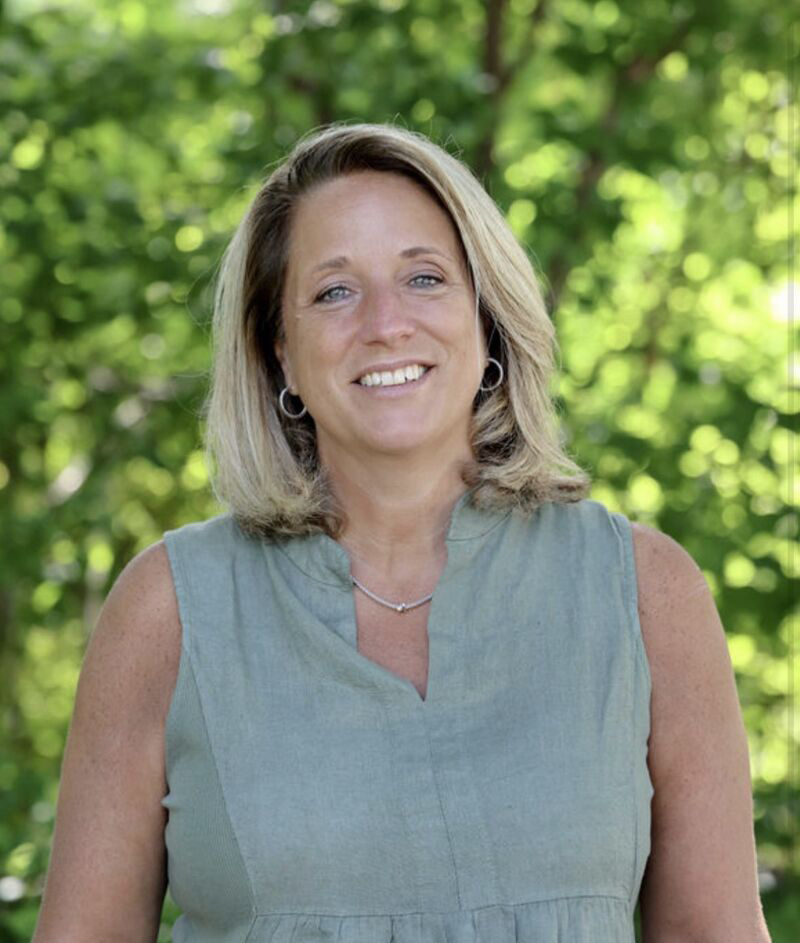RiverWoods CEO
Justine Vogel

“New Hampshire is one of the oldest states in the nation. There’s an incredible demand for services and opportunities for our older citizens.” Justine Vogel worked for RiverWoods Group before the continuing care retirement community even had residents, joining as director of accounting. Back then, co-founders Rosemary Coffin and Maryanna Hatch operated their fledgling nonprofit out of a local bar.
The RiverWoods family of communities, which celebrated its 30th anniversary in August, now also includes residential retirement centers in Durham and Manchester. It serves more than 1,100 seniors and employs more than 900 people.
“I am happy to be a 30-year employee,” Vogel said during a recent episode of the “Down to Business” podcast. “I started at RiverWoods when we were in a little room in the Folsom Tavern in Exeter before the initial buildings were opened.”
The communities RiverWoods operates for those 62 and older “provide the opportunity for independent living, assisted living, memory support and nursing care,” said Vogel, a certified public accountant who also serves on the board of directors for Unitil Corp. “There are all kinds of services that are provided, but really what we are is a community.”
This interview was edited for length and clarity. Listen to the podcast at nhbr.com
Q. Tell us about the concept of continuing care retirement communities and how they work.
A. CCRCs are the world’s most attractive insurance product. You move in when you’re healthy and at a certain age, and you pay an entrance fee. That entrance fee allows you the opportunity to avail yourself of all the community-based services while you’re still able to live completely independently.
It also provides you insurance should you, at some point in your life, ever need assisted living or memory support or nursing care. And those are provided either at the same price or a deeply discounted price from market. There are lots of great things that come with aging, like wisdom and peace and mindfulness, but there are also some challenges. Our community is really all about taking away as many of those challenges as possible so that people can live their best lives.
Q. Those entrance fees are a major life decision, something that takes a fair amount of planning and time and maybe working with your wealth management professionals to plan.
A. Most of our entrance fees run from about $300,000 to $1 million. The pricing is dependent on the size of unit you choose. So that might be a smaller one-bedroom apartment or even a studio up to a very large cottage where you’re living in a cottage but on our campus. (To pay the) entrance fee, generally people sell their single-family home and move in to our community and use the resources that the home sale provides them to pay the entrance fee. Those entrance fees, depending on our community, run from maybe 70% refundable at the time of the person’s death and the resale of their unit up to 90%, getting that back for your estate.
Then there’s monthly service fees that range from about $3,000 a month, up to $8,500 a month or so, and that covers everything included in your living within our community. So that’s your home. It’s the property taxes, it’s your utilities. it’s transportation, it’s food, it’s maintenance, housekeeping, and all kinds of good things such as cultural and educational activities.
Those prices don’t adjust as you move if you need a higher level of care, such as memory support, assisted living or nursing care. So that’s really the insurance part.
Q. Back in 2018, you had 150 apartments and a 72-bed health facility underway in Durham that sold out two years before it was scheduled to open. Has that kind of demand continued?
A. New Hampshire is one of the oldest states in the nation. There’s an incredible demand for services and opportunities for our older citizens. The waitlist that we have at our Exeter community is over 390 families. The waitlist that we have at our Durham community is over 120 families, and that’s about a third of the size of Exeter. We think we’re meeting an unmet need in the state of New Hampshire and in our local area. The hope is that we can do even more for the older citizens of New Hampshire as we go forward.
Q. Has staffing been ever been a problem, especially since the pandemic?
A. Obviously, the challenge with the pandemic was around health care workers. That will never go away. I think the reality is the number of working people in the workforce as compared to the number of people who are retired or out of the workforce. The ratio has changed forever. Just demographics tell you it won’t come back.
We continue to evolve as an organization. And you use more technology to be more efficient so that our staff can be as front-facing with our residents as possible.